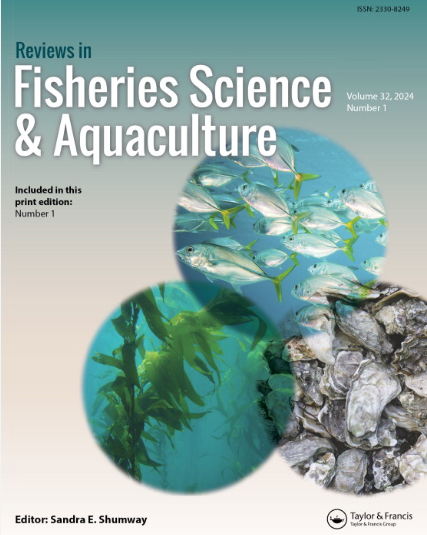人为压力源和COVID-19对水产养殖的协同影响:当前全球视角
IF 5.3
1区 农林科学
Q1 FISHERIES
引用次数: 32
摘要
COVID-19在全球范围内的快速传播,以及旨在限制或减缓其传播的措施,正在对社会各个领域产生重大影响。值得注意的是,这些影响是在包括全球气候变化在内的其他人为威胁的背景下发生的。人为压力源和2019冠状病毒病大流行都对全球水产养殖系统构成了重大经济挑战,威胁到最重要的动物蛋白来源之一的供应链,对脆弱社区可能产生不成比例的影响。在2019冠状病毒病大流行期间,在47个国家开展了一项网络调查,以评估该大流行对水产养殖活动的影响,并探讨这些影响与气候变化的影响相比如何。发现这两类驱动因素的影响之间存在正相关关系,但分析表明,大流行和人为压力因素影响供应链的不同部分。直接可测量的报告损失因水产养殖类型(陆地与海洋,集约化与粗放化)而异。对采用综合多营养水产养殖(IMTA)方法的农户的影响相对较低,这表明IMTA可以通过在COVID-19大流行期间提供不同的市场选择来增强对多种压力源的抵御能力。研究结果强调了在多重压力源视角下评估COVID-19有害影响的重要性,重点关注过去十年中已经因人为压力源而局部遭受经济损失的地区。为了最大限度地提高水产养殖部门的长期抵御能力,需要采取整体政策,同时应对其他持续存在的人为压力因素,而不是仅仅关注COVID-19的严重影响。本文章由计算机程序翻译,如有差异,请以英文原文为准。
The Synergistic Impacts of Anthropogenic Stressors and COVID-19 on Aquaculture: A Current Global Perspective
Abstract The rapid, global spread of COVID-19, and the measures intended to limit or slow its propagation, are having major impacts on diverse sectors of society. Notably, these impacts are occurring in the context of other anthropogenic-driven threats including global climate change. Both anthropogenic stressors and the COVID-19 pandemic represent significant economic challenges to aquaculture systems across the globe, threatening the supply chain of one of the most important sources of animal protein, with potential disproportionate impacts on vulnerable communities. A web survey was conducted in 47 countries in the midst of the COVID-19 pandemic to assess how aquaculture activities have been affected by the pandemic, and to explore how these impacts compare to those from climate change. A positive correlation between the effects of the two categories of drivers was detected, but analysis suggests that the pandemic and the anthropogenic stressors affect different parts of the supply chain. The immediate measurable reported losses varied with aquaculture typology (land vs. marine, and intensive vs. extensive). A comparably lower impact on farmers reporting the use of integrated multitrophic aquaculture (IMTA) methods suggests that IMTA might enhance resilience to multiple stressors by providing different market options under the COVID-19 pandemic. Results emphasize the importance of assessing detrimental effects of COVID-19 under a multiple stressor lens, focusing on areas that have already locally experienced economic loss due to anthropogenic stressors in the last decade. Holistic policies that simultaneously address other ongoing anthropogenic stressors, rather than focusing solely on the acute impacts of COVID-19, are needed to maximize the long-term resilience of the aquaculture sector.
求助全文
通过发布文献求助,成功后即可免费获取论文全文。
去求助
来源期刊

Reviews in Fisheries Science & Aquaculture
FISHERIES-
CiteScore
25.20
自引率
0.90%
发文量
19
期刊介绍:
Reviews in Fisheries Science & Aquaculture provides an important forum for the publication of up-to-date reviews covering a broad range of subject areas including management, aquaculture, taxonomy, behavior, stock identification, genetics, nutrition, and physiology. Issues concerning finfish and aquatic invertebrates prized for their economic or recreational importance, their value as indicators of environmental health, or their natural beauty are addressed. An important resource that keeps you apprised of the latest changes in the field, each issue of Reviews in Fisheries Science & Aquaculture presents useful information to fisheries and aquaculture scientists in academia, state and federal natural resources agencies, and the private sector.
 求助内容:
求助内容: 应助结果提醒方式:
应助结果提醒方式:


